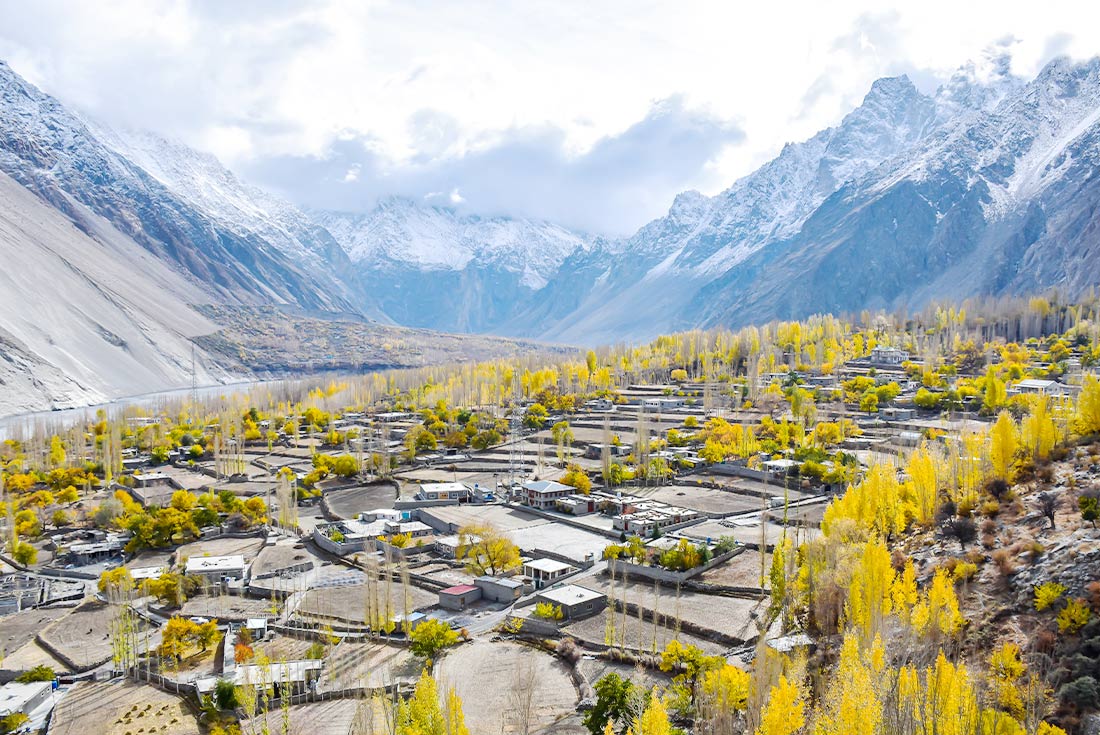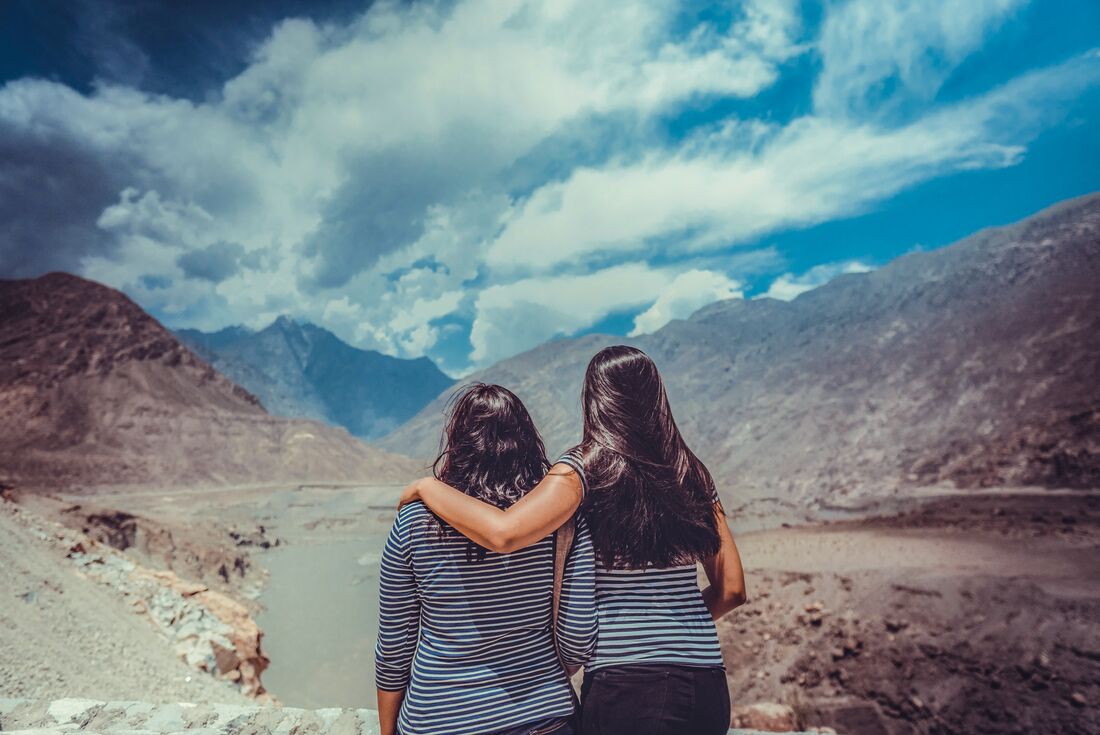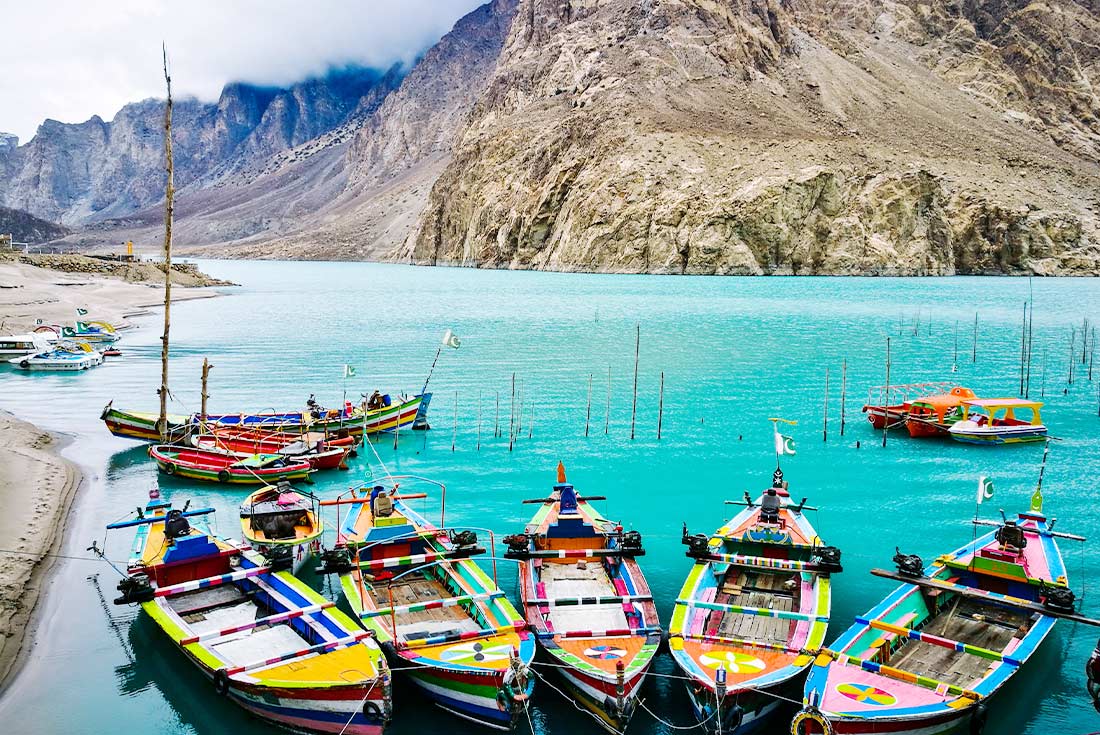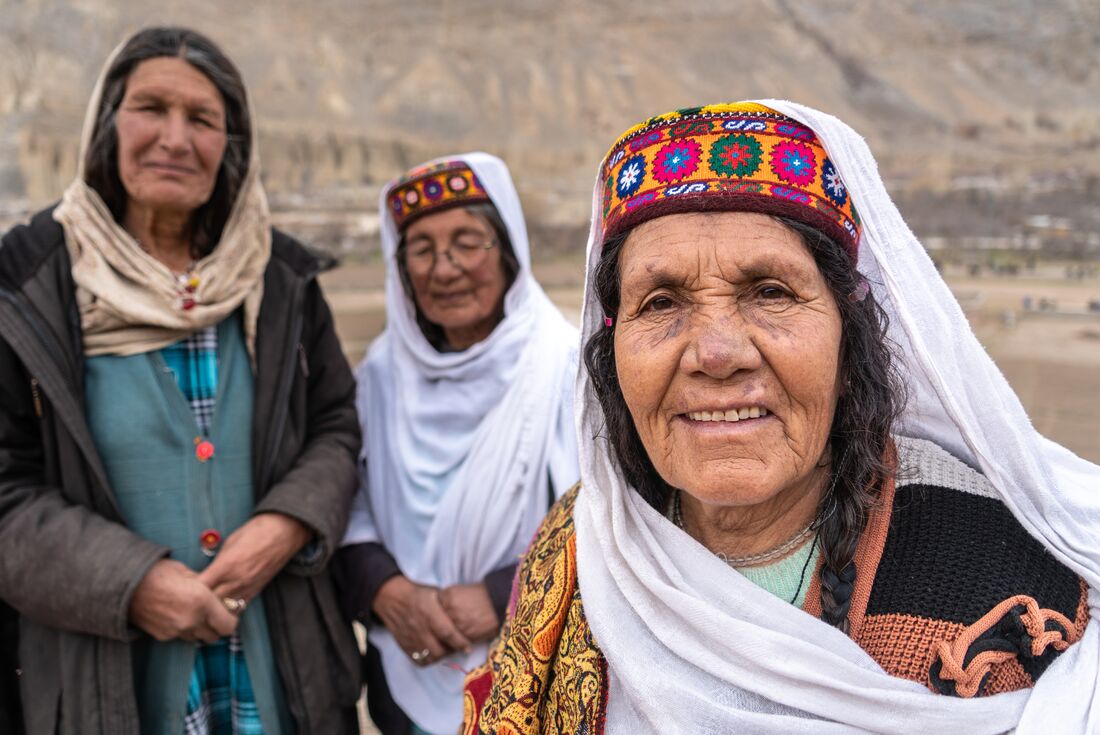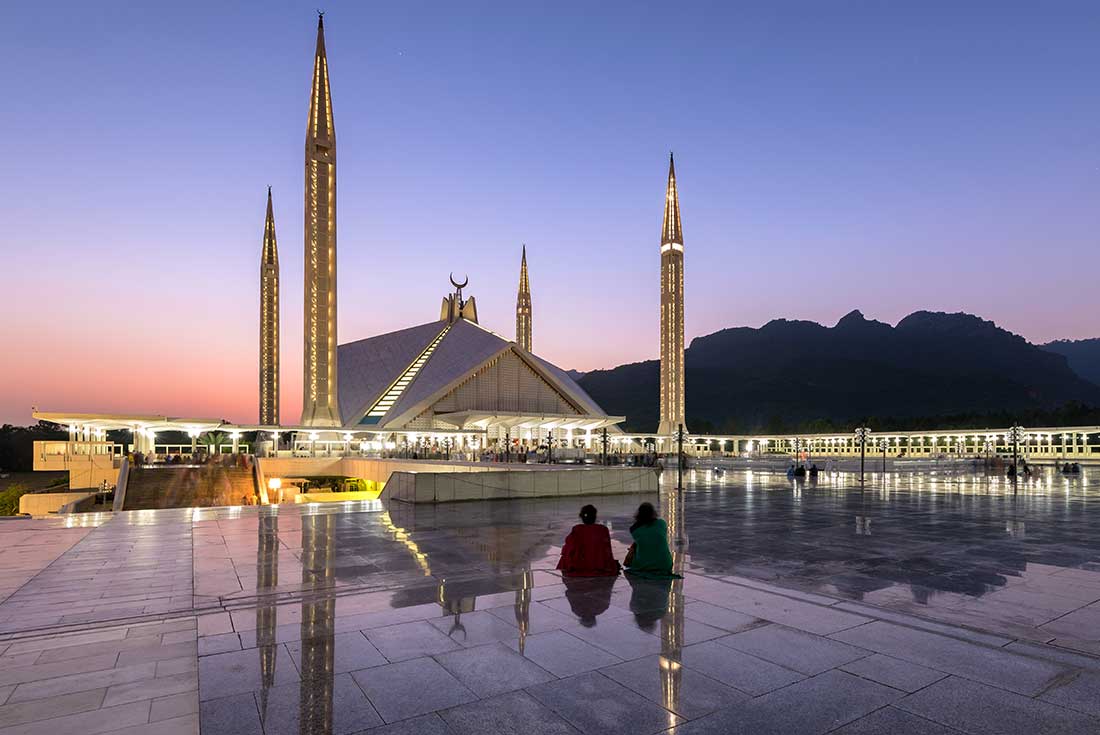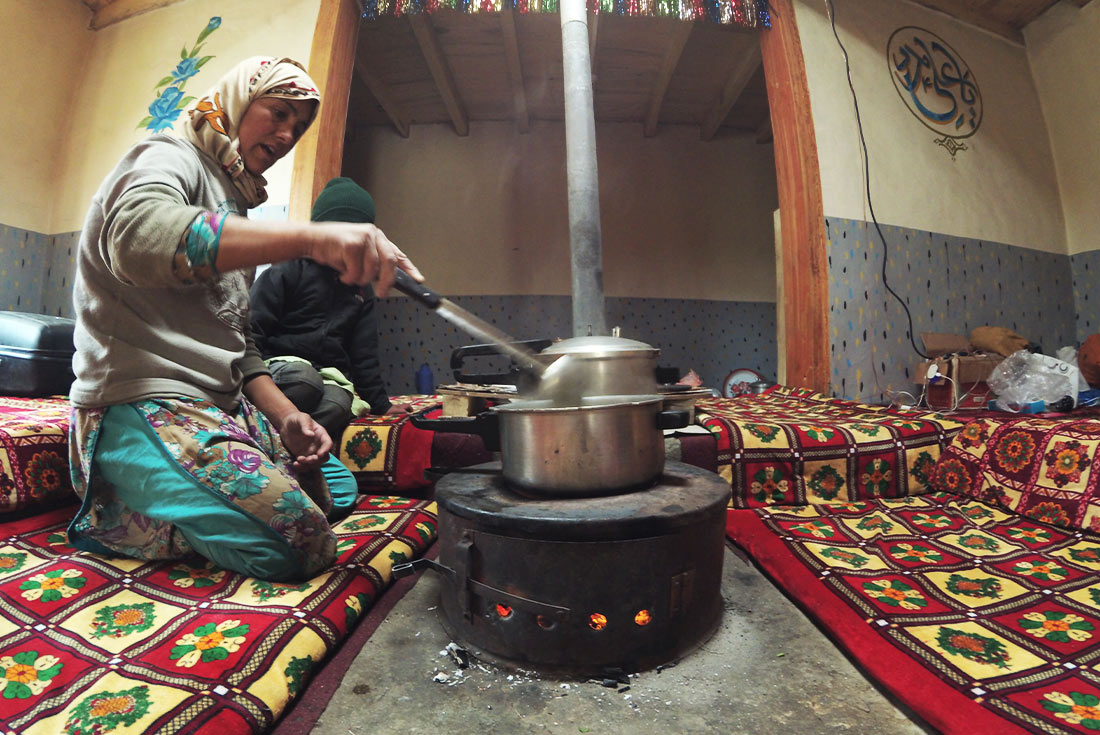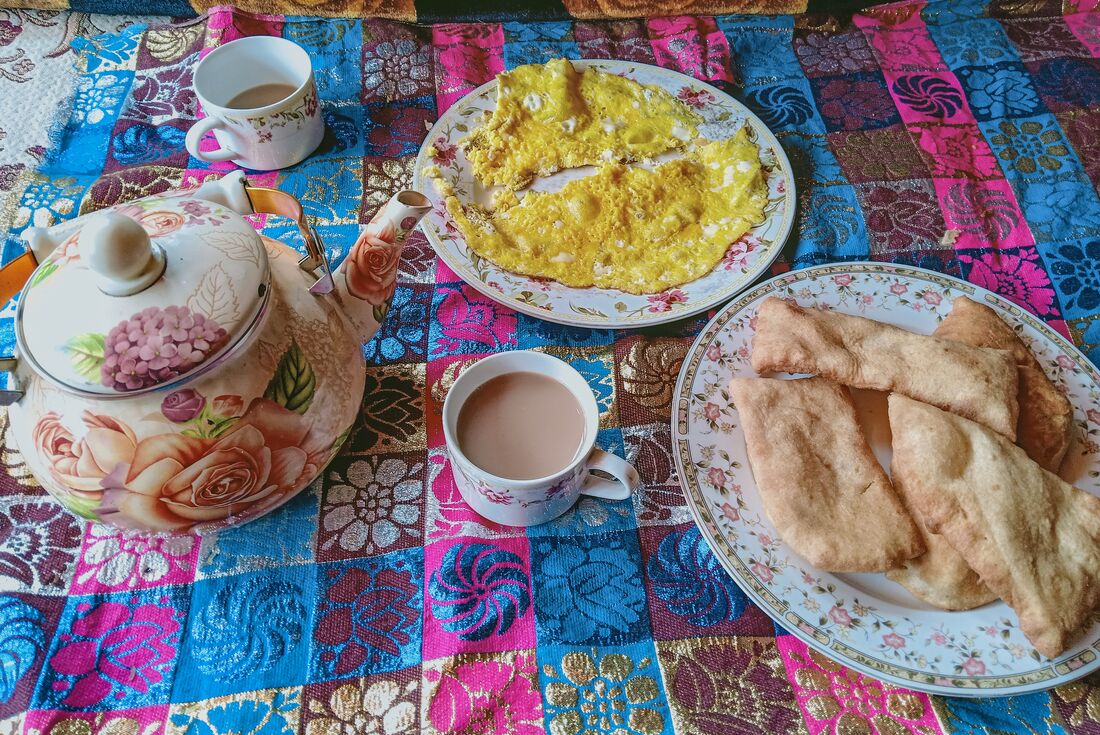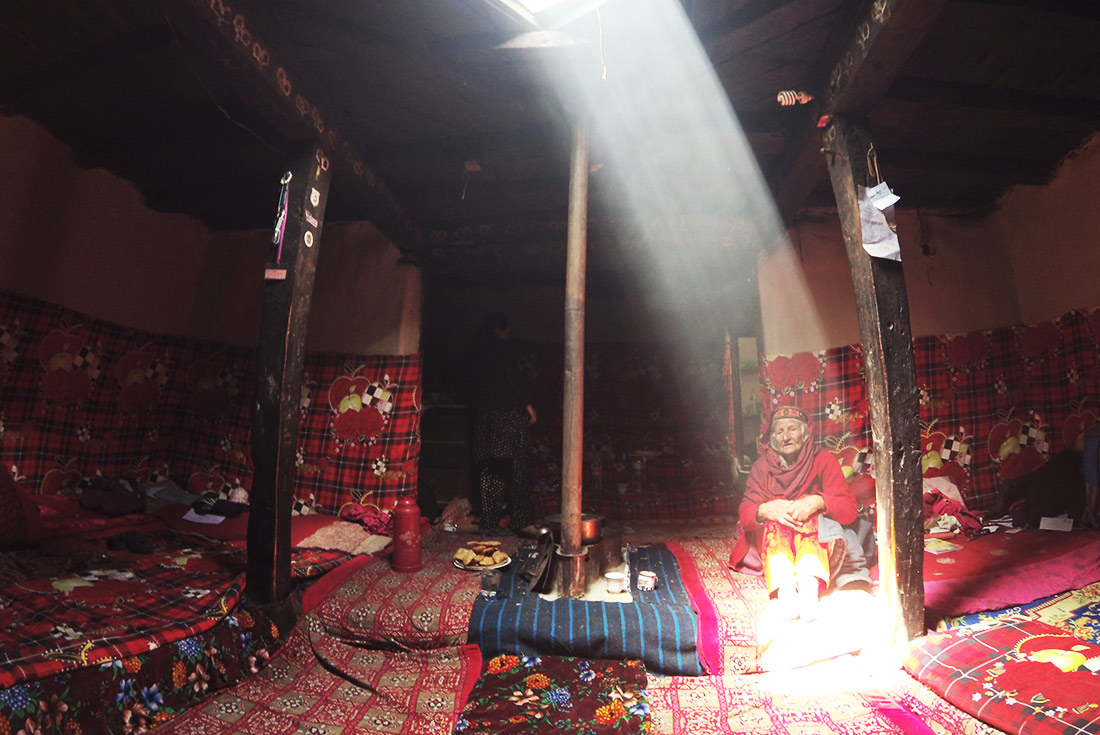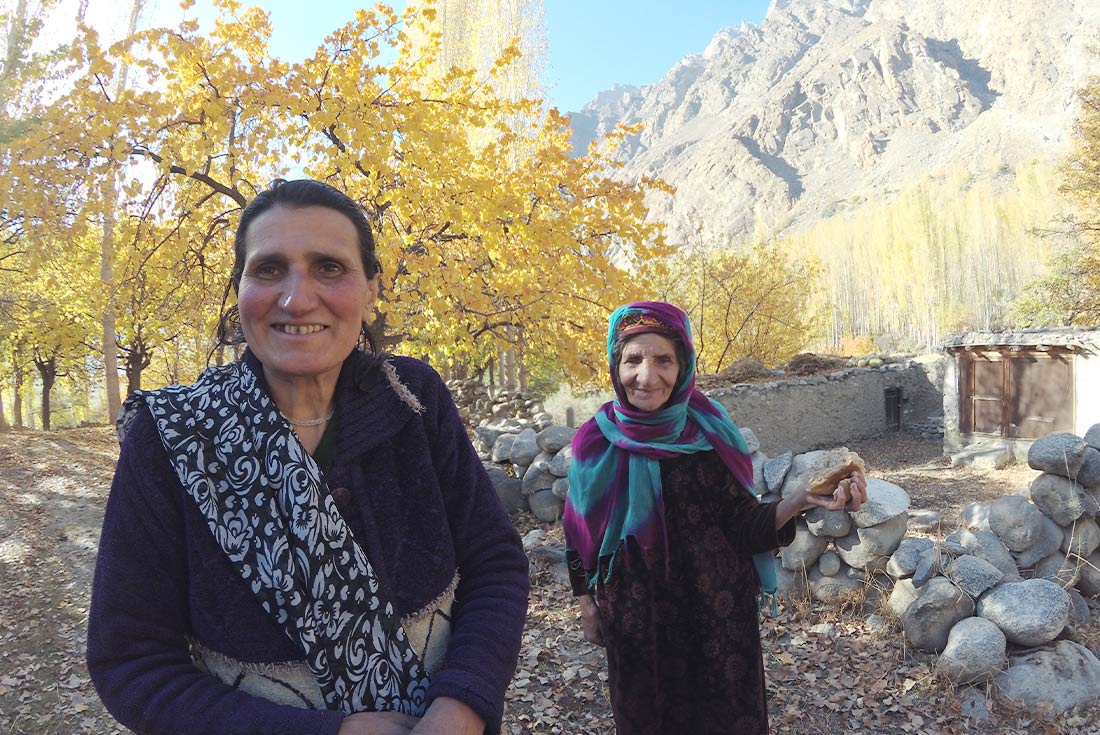- This is a rare opportunity to travel through Pakistan with a local female leader. Her knowledge and insights will make this an eye-opening and unforgettable expedition.
- Experience a unique female-only salon, owned by a local woman and run out her home in Gulmit, a town that has existed for hundreds of years and is surrounded by mountains and glaciers.
- Spend time with the inspiring women working to empower their communities through local projects including carpet-weaving, cooking classes and cafes.
- Immerse yourself in remote mountain villages while staying overnight and sharing food and stories with a local family.
05 Jul 2023
Pakistan: Women's Expedition
HQSW
Validity: 01 Jan 2023 to 31 Dec 2030
Learn what life looks like for women living in Pakistan’s vibrant capital city and ancient mountain villages. Join a local female leader as she takes you on a unique journey to the Hunza Valley. See the communities and landscapes associated with the hallowed Karakoram and Hindu Kush mountains and meet pioneering women working on female empowerment projects throughout the region. Trek to alpine lakes, ancient glaciers and the remnants of ruined empires, then witness the evolution of modern Pakistan in the country’s capital of Islamabad. From cooking classes to village homestays, this women’s only expedition will have you sharing more than just photographs.
Original
Women's Expedition
Private Vehicle,4WD,Plane
3
Grand Islamabad Hotel
Street #1, E-11/1, MPCHS, Islamabad
Islamabad
PAKISTAN
Phone: +92 512304846
Fax: +92 518316786
Grand Islamabad Hotel
Street #1, E-11/1, MPCHS, Islamabad
Islamabad
PAKISTAN
Phone: +92 512304846
Fax: +92 518316786
1. An optional single supplement is available on this trip and includes all hotel stay nights and staying in a nearby guesthouse during the nights in Hopar instead of a homestay. The nights in the traditional guesthouse in Gulmit are excluded. Please speak to your booking agent for further information. 2. Passport scans are required at the time of booking to book domestic flights
All group trips are accompanied by one of our group leaders. The aim of the group leader is to take the hassle out of your travels and to help you have the best trip possible. Intrepid endeavours to provide the services of an experienced leader however, due to the seasonality of travel, rare situations may arise where your leader is new to a particular region or training other group leaders. Your leader will provide information on the places you are travelling through, offer suggestions for things to do and see, recommend great local eating venues and introduce you to our local friends. While not being guides in the traditional sense, you can expect them to have a broad general knowledge of the places visited on the trip, including historical, cultural, religious, and social aspects. At Intrepid we aim to support local guides who have specialised knowledge of the regions we visit. If you are interested in delving deeper into the local culture at a specific site or location then your leader can recommend a local guide service in most of the main destinations of your trip.
Most national governments provide regularly updated foreign travel advice on safety issues involved with international travel. We recommend that you check your government's advice for their latest travel information before departure and ensure that your travel insurance covers you for all destinations and activities on your trip. Please refer to our website's safety page for links to major travel advisories and updates on safety issues affecting our trips here: https://www.intrepidtravel.com/travel-alerts We strongly recommend the use of a neck wallet or money belt while travelling, for the safe-keeping of your passport, flight tickets, cash and other valuable items. Leave your jewellery at home - you won't need it while travelling. Many of our hotels have safety deposit boxes, which is the most secure way of storing your valuables. A lock is recommended for securing your luggage. Your leader will accompany you on all included activities, however, during your trip you'll have some free time to pursue your own interests or relax and take it easy. While your leader will assist you with the available options in a given location, please note that any optional activities you undertake are not part of your Intrepid itinerary, and Intrepid makes no representations about the safety of the activity or the standard of the operators running them. Please use your own good judgement when selecting an activity in your free time. Please also note that your Leader has the authority to amend or cancel any part of the trip itinerary if it's deemed necessary due to safety concerns. Intrepid's operational safety policies can be viewed on our website at the link below. We recommend that you take a moment to read through this information before travelling, and would appreciate any feedback on how safety is being managed on our trips.
https://www.intrepidtravel.com/safety-guidelines
WOMEN'S SAFETY: Women should exercise caution when travelling in Pakistan. While the risk of an incident occurring on your trip is very low, below are some things you can do for your safety and peace of mind when travelling: - Respect local dress codes and customs and dress more conservatively than you do at home. Please see section on conservative dress. - Avoid isolated areas, including beaches, unlit city streets and village lanes when alone at any time of day. - Avoid travelling alone on public transport, or in taxis or auto-rickshaws, especially at night. - If you have to use a taxi get them from hotel taxi ranks and use pre-paid taxis at airports. Try to avoid hailing taxis on the street. - If you’re being collected at the airport by a driver make sure they have properly identified themselves before you set off. For further information and advice, visit: https://www.intrepidtravel.com/au/pakistan/is-it-safe-to-travel-pakistan https://www.gov.uk/government/publications/2010-to-2015-government-policy-british-nationals-overseas/2010-to-2015-government-policy-british-nationals-overseas#appendix-2-advice-for-women-travellers https://www.smartraveller.gov.au/before-you-go/who-you-are/women PERSONAL BELONGINGS: We strongly recommend the use of a neck wallet or money belt while travelling, for the safe-keeping of your passport, air tickets, cash and other valuable items. Leave your valuable jewellery at home - you won't need it while travelling. Many of our hotels have safety deposit boxes, which is the most secure way of storing your valuables. A lock is recommended for securing your luggage. FREE TIME: Your leader will accompany you on all included activities, however during your trip you'll have some free time to pursue your own interests, relax and take it easy or explore at your leisure. Please use your own good judgement when selecting an activity in your free time. Please also note that your group leader has the authority to amend or cancel any part of the trip itinerary if it's deemed necessary due to safety concerns. PERSONAL SAFETY: While travelling there is always the risk of pick-pocketing and petty theft, particularly in the more touristy cities. We recommend that you exercise caution when walking alone at night and encourage you to walk together and only on main, well-lit thoroughfares. Be particularly vigilant on public transport. Simple measures like carrying your day pack on your front, not hanging your bag over the back of your chair and wearing a money belt will reduce any chance that your valuables should go missing. SCAMS: Scams involving ATM and credit cards, train tickets, taxis, temple donations and tourist guides operate throughout Pakistan. If you are the victim of a scam, report it immediately to the nearest police station. Even though they may not be able to get your money or goods back, they can issue you with an official loss report for insurance purposes.
PASSPORT You’ll need a valid passport to travel internationally and most countries require your passport to have a minimum of 6 months validity, so remember to check the expiry date. We need your passport information to get everything ready for your trip so it’s important that the information on your booking matches your passport exactly. Please take care to provide the correct details. We recommend carrying a copy of the photo page of your passport while travelling and leaving a copy at home with family or friends. VISAS Many countries require a visa and obtaining the correct visa is your responsibility. We recommend you check your visa requirements as soon as you have booked your trip. This will ensure you have time to prepare your documents and for your visa application to be processed. Entry requirements can change and are different depending on your nationality. Please refer to your government's foreign travel advisories, the consular websites for the countries you’re travelling to and those you may transit through. Always follow visa advice from official websites; not all visa information found online may be valid. You can also head to Intrepid’s Entry & Health requirement page to get the latest information on travel documents and visa requirements, plus local government COVID-19 vaccination and quarantine policies: https://www.intrepidtravel.com/au/visa-health-requirements PAKISTAN: You must obtain your Pakistan visa in advance. We recommend applying for an Online Tourist Visa, available for select nationalities including but not limited to the following: Australia, Canada, New Zealand, Germany, UK & USA. Passport holders from these countries can apply for an e-visa by following the instructions at - https://visa.nadra.gov.pk/. We do not recommend applying for a Tourist Visa On Arrival as difficulties with this scheme have been reported. IMPORTANT: - E-Tourist Visas are available for Single Entry for visits less than 3 months (first time entry). If you plan to be in Pakistan longer you will need to apply for a visa extension. You must have a valid Pakistani Visa and already be in Pakistan to apply for an extension. - Tourist visas are available in Single and Multiple Entry. Be sure to check the date you require a visa from and the length of time you will need to cover. LETTER OF INVITATION FOR PAKISTAN VISA APPLICATION: You will need a Letter of Invitation to assist you in applying for your visa. This will be issued by our local office in Pakistan and sent to you by Intrepid or your travel agent three to four months before departure. If you do not receive this, email us with your booking number and trip details. Please note that this information can change at any time. Please always refer to https://visa.nadra.gov.pk/ for up to date information. This is the only official visa online site. There are other mirror sites that are run by visa service companies or scammers and may not be reliable.
This is a rare opportunity to travel through Pakistan with a local female leader. Her knowledge and insights will make this an eye-opening and unforgettable expedition.
Experience a unique female-only salon, owned by a local woman and run out her home in Gulmit, a town that has existed for hundreds of years and is surrounded by mountains and glaciers.
Spend time with the inspiring women working to empower their communities through local projects including carpet-weaving, cooking classes and cafes.
Immerse yourself in remote mountain villages while staying overnight and sharing food and stories with a local family.
This trip visits places as high as 3600 metres above sea level, which can cause altitude sickness, regardless of age or physical health. Please see the ‘Health’ section of the Essential Trip Information for more details on travelling at altitude and ensure you are familiar with signs of AMS. The weather can be unpredictable in the mountains and a significant number of flights to/from Islamabad and Gilgit are delayed or cancelled due to weather conditions. If your flight is cancelled we will endeavour to get your group on the next available flight. Failing that, we will follow a contingency plan by private vehicle. This trip involves some long travel days, which can be tiresome but offer a quintessential experience of the beautiful landscape and hospitable people of Pakistan. While we would love to open up these unique experiences to all our travellers regardless of gender, it’s simply not yet possible to do so while operating in a socially responsible and culturally sensitive manner. If you're interested in travelling to Pakistan on a similar itinerary, check out our Pakistan Expedition (code HQSP) or consider booking a private group tour.
GENERAL HEALTH All travellers need to be in good physical health in order to participate fully on this trip. When selecting your trip please make sure you have read through the itinerary carefully and assess your ability to manage and enjoy our style of travel. Please note that if in the opinion of our group leader or local guide any traveller is unable to complete the itinerary without undue risk to themselves and/or the rest of the group, we reserve the right to exclude them from all or part of a trip without refund. You should consult your doctor for up-to-date medical travel information or for any necessary vaccinations before departure. We recommend that you carry a first aid kit as well as any personal medical requirements in their original packaging as they may not easily be obtained while travelling. COVID-19 The safety and wellbeing of our travellers, leaders, crew, staff, and suppliers continues to remain our highest priority as we travel. You can read more about how we will keep you safe on our trips, including our COVID-19 Health & Safety Guidelines here: https://www.intrepidtravel.com/safe-travels VACCINATION POLICY From 1 January 2023, Intrepid will no longer require travellers to provide proof of vaccination against COVID-19 for this trip. However, we continue to strongly recommend that all travellers get vaccinated to protect themselves and others. Specific proof of testing or vaccination may still be required by your destination or airline. Please ensure you check travel and entry requirements carefully. For more information, including a detailed FAQ about this policy, please visit https://www.intrepidtravel.com/covid19. HEALTH SCREENING If you are unwell prior to travelling, please stay at home and contact us to make alternative arrangements. From 1 January 2023, Intrepid will no longer require travellers to complete a self-screening health form at the group meeting for this trip. If you are displaying any COVID-19 symptoms or have any health concerns during the trip, we will follow the advice of local health authorities to determine whether medical assistance, isolation or further action is required. Travellers who test positive while taking part in an Intrepid trip will need to leave the group for a minimum of five days and may only rejoin the group if presenting as asymptomatic – our team will assist them in arranging a place to self-isolate and any onward journey. It's quite possible that the destination country may have different or more strict protocols than your home country regarding COVID-19. This may include hotel or hospital quarantine or quarantine for the group. Please check your government's travel advice or contact the closest embassies to find out the details. We ask all travellers to continue to monitor their health throughout their travels and report any relevant symptoms to their tour leader. AIR POLLUTION: During winter months (October-February), air pollution levels in parts of Pakistan can spike to problematic levels. Severe pollution can increase the risk of respiratory problems. Those with pre-existing medical conditions, particularly heart and lung conditions, may be especially affected. Your leader can assist you to obtain a face mask if required. ALTITUDE SICKNESS: Travellers to altitudes higher than 2,500m are at risk of altitude sickness, also known as acute mountain sickness (AMS). This can be life threatening and affect anyone, even people who are very physically fit. There is a higher risk for those who have had altitude sickness before, who exercise or drink alcohol before adjusting to the altitude, or who have health problems that affect breathing. If your tour travels to high altitude, see your doctor for advice specific to you and your situation before you depart. It is important to be aware of the normal altitude symptoms that you may encounter BUT NOT worry about: - Periods of sleeplessness - Occasional loss of appetite - Vivid, wild dreams at around 2500-3800m in altitude - Unexpected momentary shortness of breath, day and night - Periodic breathing that wakes you occasionally - Blocked nose - Dry cough - Mild headache If you are feeling nauseous, dizzy or experience other symptoms, please be sure to let your group leader know immediately so that we can monitor your condition. Please be aware that should your group leader deem it unsafe for you to continue trekking at any time, they will arrange for you to descend to a lower attitude. Please read the following document carefully and, during your trip, utilise the table on the back daily to record your own perspective of your general health and any symptoms you may experience: https://www.intrepidtravel.com/altitude-sickness MOSQUITO-BORNE ILLNESSES: Malaria is a risk in parts of Pakistan, including major cities. Cases of dengue fever are reported, especially in the period after the monsoon. Other mosquito-borne diseases (including Japanese encephalitis, chikungunya fever, and filariasis) also occur. Take preventative measures such as as wearing long clothing, using repellent and being indoors particularly around dusk and dawn. Consult a medical professional regarding prophylaxis against malaria. For more information, see the World Health Organisation's fact sheets: https://www.who.int/neglected_diseases/vector_ecology/mosquito-borne-diseases/en/ OTHER INFECTIOUS DISEASES: Water-borne, food-borne, parasitic and other infectious diseases (including meningitis, cholera, polio, typhoid, hepatitis, tuberculosis, diphtheria and rabies) are common in Pakistan. Tap water is not safe to drink. Seek medical attention if you suspect food poisoning, if you have a fever or suffer from diarrhoea. POLIO VACINATION: If you are planning to stay in Pakistan for 4 weeks or more, proof of polio vaccination, given 4 weeks to 12 months before departure from Pakistan, may be required on exit. If you are unable to provide this, you may need to be vaccinated before leaving Pakistan.
While travelling with us you'll experience the vast array of wonderful food available in the world. Your group leader will be able to suggest restaurants to try during your trip. To give you the maximum flexibility in deciding where, what and with whom to eat, generally not all meals are included in the trip price. This also gives you more budgeting flexibility. As a rule our groups tend to eat together to enable you to taste a larger variety of dishes and enjoy each other's company. If you have dietary requirements and/or food allergies, please let your booking agent know prior to departure. Though the food in Pakistan is no doubt delicious, it’s not necessarily the ‘clean-eating’ diet of your dreams. There’s a lot of oil, meat and bread, and a fresh Waldorf salad can be rather difficult to come by. Like India, Pakistan’s hygiene standards can sometimes be lacking and it’s not uncommon for travellers to experience stomach troubles at some point in their journey. This is just a part of travelling in the developing world. Your tour leader will be able to direct you towards restaurants that are known to have better hygiene, especially in tourist areas where they are travelling with our groups regularly. If you are a strict vegetarian you may find travelling in Pakistan difficult at times. Meat is a daily staple, and things may be awkward if your host cooks up a feast and is unaware of your diet. Travelling as a vegan is particularly difficult as many dishes will include butter, ghee butter or yoghurt. Furthermore, vegetarian dishes are sometimes cooked with meat stock or in the same pot as meat. It’s possible, yes, but it’s important to be clear while understanding that veganism just isn’t a concept in Pakistan.
SPENDING MONEY When it comes to spending money on the trip, every traveller is a little different. You know your spending habits better than we do, so please budget an appropriate amount for things like optional meals, drinks, shopping, optional activities, and laundry. Make sure you have read the itinerary and inclusions thoroughly so you know what is included in the trip price and what you may need to pay for while travelling. The official currency of Pakistan is the Pakistan Rupee (PKR). Please note you will not be able to pay for services in any other currency. CREDIT CARDS, ATMS AND MONEY EXCHANGE: Credit cards are generally accepted in tourist shops and some restaurants in big cities. Smaller venues take cash only. Foreign currency is easily changed at exchange bureaus and they generally offer the best rates. It is better to exchange currency in Islamabad. Rural areas have limited infrastructure in this regard. With ATMs being increasingly available in the many major towns and cities, credit or debit cards are a convenient way to access money. However, not all banks accept foreign cards (Islamic banks won’t take foreign cards) and ATMs in the mountains have been known to run out of cash. Be aware that your withdrawing limit may vary from country to country (regardless of your limit in your home country) and it can be as low as the equivalent to USD100 per day. Throughout Pakistan, cards with the Visa logo are most readily recognised, although MasterCard is also accepted in most places. A charge is made for each international transaction - please check with your bank how much this fee will be. Check with your bank before leaving home that your card can be used as a debit card in Pakistan. You may also want to notify your bank that you are going overseas as it's not unknown for banks to freeze cards which show sudden transactions in other countries. DEPARTURE TAX: The departure tax is Pakistani Rupees 2,800 (approx. USD 20). You will need to have cash for this. TIPPING Tipping can be an appropriate way to recognise great service when travelling. While it may not be customary in your home country, it is an entrenched feature of the tourism industry across many of our destinations and is greatly appreciated by the people who take care of you during your travels. It is always best to avoid tipping with coins, very small denomination notes, or dirty and ripped notes, as this can be regarded as an insult rather than the goodwill gesture it is intended to be. OPTIONAL TIPPING KITTY On Day 1 of your trip, your tour leader may discuss with you the idea of operating a group tipping kitty, whereby everybody contributes an equal amount and your tour leader distributes tips for drivers, local guides, hotel staff and other services included on your trip. This excludes restaurant tips for meals not included in your itinerary. The leader will keep a running record of all monies spent which can be checked at any time, and any funds remaining at the end of the tour will be returned to group members. We have found that this is easiest way to avoid the hassles of needing small change and knowing when and what is an appropriate amount to tip. Participation in this kitty is at your own discretion, and you are welcome to manage your own tipping separately if you prefer. Please note the tipping kitty excludes tips for your tour leader. TIPPING KITTY Over the years we have found that many of our travellers find the need for tipping local guides and operators to be both tiresome and embarrassing, especially if they don't have the correct small change. To overcome this, your leader might raise the idea of a group tipping kitty. At your group meeting, your tour leader may discuss the idea of running this kitty, whereby everybody contributes an equal amount and then your tour leader pays the tips as you go. The leader will keep a running record of all monies spent (except restaurant tips). The record can be checked at any time and any money remaining at the end of the tour returned to group members. This kitty does not include tips for your leader and crew. YOUR TOUR LEADER You should consider tipping your leader for outstanding service throughout your trip. The amount is entirely a personal preference; however as a guideline US$3-4 per person, per day can be used. Of course you are free to tip more or less as you see fit, depending on your perception of service quality and the length of your trip. Remember, a tip is not compulsory and should only be given when you receive excellent service. LOCAL GUIDES Throughout your trip you may at times have a local guide in addition to your leader. We suggest around USD 2-4 per person, per day for local guides. GENERAL Restaurants: 8 -10% of the total bill amount is appropriate. CONTINGENCY FUNDS We try to plan for every eventuality, but there are still some things beyond our control. We reserve the right to change an itinerary after departure due to local circumstances or a Force Majeure Event. In such emergency circumstances, the additional cost of any necessary itinerary alterations will be covered by you. Please note we are not responsible for any incidental expenses that may be incurred as a result of the change of itineraries including but not limited to visas, vaccinations or non-refundable flights. Make sure you have access to an extra US$500 for emergencies (e.g. severe weather, natural disasters, civil unrest) or other events that result in unavoidable changes to the itinerary (e.g. transport strikes or cancellations, airport closures). Sometimes these things necessitate last-minute changes to enable our trips to continue to run, and as a result, there may be some extra costs involved. The recommended amount is listed in USD for the relatability of universal travellers, however, local currency may be needed once in the country to cover these costs.
What you need to bring will vary according to the trip style you have chosen, the countries you are visiting and when you are travelling. Generally speaking, we recommend you pack as lightly as possible and make sure that you are able to carry and lift your own luggage, and walk with it for short distances or up or down a flight of stairs. Our travellers usually find the smaller their luggage is, the more they enjoy the trip not having to worry about carrying heavy bags! Aim to keep your main luggage under 15kg. Many travellers carry their luggage in a compact smaller suitcase or backpack with wheels. We recommend your bag has carry straps or handles so it is easy to lift and carry for the times you are unable to wheel it (ie. on rough surfaces or up steps). If you are taking overnight trains, or primarily using public transport then the smaller your luggage the easier it will be to store under or above bunks. Large suitcases may not be able to be taken on board. A lockable bag or small padlock for your bag will be useful especially when travelling on public transportation as well. You'll also need a day pack/bag to carry water, camera, swimming suit, hiking shoes and jacket etc. when you’re exploring during the day. Below we have listed the essentials for this trip:
https://www.intrepidtravel.com/packing-list
ESSENTIALS: - Pillow or travel pillow - Travel towel - Closed in shoes. We highly recommend that you take a pair of comfortable, closed-in hiking shoes. Closed-in shoes will help to protect your feet from cuts and scratches when walking in the mountains, and will also act as a barrier protection in rare cases against bites or stings. - Lightweight long clothing. You will need to bring a mixture of lightweight clothing, some warm items for the evenings. Women must cover their legs at all times, and no sleeveless tops as Pakistan is a Muslim country. Men can wear shorts however it is very uncommon. Ex-military, camoflage or military style clothing and equipment is NOT recommended. - Warm fleece and beanie for morning and evening activities. - Swimwear - Sun protection - hat, sunscreen, sunglasses - Insect repellent RECOMMENDED: - Optional sleeping bag/sleeping sheet for homestays. Your hosts will be providing mattresses and blankets, so it is based on personal preference. Note, it can get very cold at night in the desert and mountainous regions of Pakistan. - A good quality, high-beam headlamp or torch. - Waterproof/windproof jacket is a good idea for wet days, and early morning or evening activities when it can be cool. - Personal medical kit. Large kits will be on hand at the lodges and from your leader (on trips that have a dedicated trip leader) but we recommend you carry items such as mild pain killers, electrolytes and bandaids. - Camera with spare battery or power bank. OPTIONAL: - Ear plugs to guard against snoring. - A good book, a journal or smart phone with music player. LUGGAGE LIMIT: Please keep your luggage to a minimum. One small soft-sided bag plus a day pack (no more than 15-20kgs in total per person) is essential. We recommend against bringing hard/externally framed suitcases as they are difficult to store and can damage equipment and other travellers' belongings. If your trip is beginning and ending at the same location, excess luggage can usually be stored at your arrival/departure hotel and can be collected after your trip. VALUABLES: Please try to avoid bringing unnecessary valuables, and use your hotel safe. It’s also a good idea to purchase a money belt or pouch that is easily hidden. We strongly recommend that you photocopy all important documents e.g. air tickets, passport, vaccination certificate, etc. and keep the copies separate from the originals. While not valid, a photocopy makes it very much easier to obtain replacements if necessary. BATTERIES/POWER: Our trips have access to power to recharge batteries for phones and cameras every couple of days. We always recommend that you carry an extra battery or powerbank just in case. CONSERVATIVE DRESS: Pakistan is a traditional Islamic nation and modest dress is required. Men can wear shorts but they are not very common and not allowed in religious areas. Loose fitting cotton pants are preferable for the heat. Tank tops should not be worn however short sleeve shirts that cover your shoulders are acceptable for men. It is necessary for women to wear a headscarf when visiting mosques. It's perfectly acceptable for women to wear a headscarf that shows some of their fringe. We recommend always having a headscarf with you to cover up in religious places or conservative areas to avoid unwanted attention. Its acceptable for women to wear tights with loose long linen or cotton shirts, or even long light cardigans. These need to be long enough to cover your bottom. Your group leader will advise you of what attire is appropriate during the welcome meeting. Open-toed sandals are acceptable for both sexes. Slip-on footwear is handy as you have to remove your shoes before entering mosques and homes. You will be taken to shop for local clothing, headscarfs, salwar kameez (the local pants/top worn by men and women) on Day 2 of the itinerary.
LUGGAGE LIMITS: Domestic flights in Pakistan have strict weight limits - 20kg of check-in luggage and 5kg of carry-on hand luggage per person is included with your flight ticket.
We like to think our Intrepid travellers are all connected by a love of adventure and passion for seeing the world in a different way. We've laid down a few non-negotiable rules to ensure everyone feels connected, comfortable and safe on our trips. We ask that you respect your fellow travellers, group leader, and local people and places we visit in all circumstances. We don't tolerate any forms of violence and expect that you follow the local laws, customs and regulations in any destination we travel to. Any behaviour contrary to the above, including any behaviour that prevents our staff from performing their duty of care or continuing the itinerary as planned, may result in travellers being removed from the trip. If you consume alcohol while travelling, we encourage responsible drinking and expect you to abide by local alcohol laws. To ensure the well-being of everyone on the trip, all decisions made by group leaders and ground staff are final. Romantic relationships between travellers and group leaders are not permitted while on trip. By travelling with us, you agree to comply with these rules and the laws and customs of all countries visited. If something is concerning you during your travels with us, please speak to your group leader or local guide immediately. Alternatively, contact us on the emergency contact number detailed in your Essential Trip Information’s Problems and Emergency Contact section. ALCOHOL, DRUGS AND CONTRABAND: Alcohol is restricted in Pakistan. Non-Muslim foreigners are allowed to order alcohol in restaurants and hotels that have liquor licenses, and foreigners can also apply for alcohol permits, however these can be tedious to obtain. The death penalty can and has been imposed for crimes including blasphemy, murder, drug offences, rape and unlawful assembly. If found, pork products, obscene material (even glossy magazines showing people in immodest poses), and controversial literature will all be confiscated by custom officials. Upon arrival, you as a foreigner will likely be whisked through customs but note that random bag checks do commonly occur.
Can’t stop thinking about your adventure? Tell us all about it! We read each piece of feedback carefully and use it to make improvements for travellers like you. Share your experience with us at: http://www.intrepidtravel.com/feedback/
While we always endeavour to provide the best possible holiday experience, due to the nature of travel and the areas we visit sometimes things can and do go wrong. Should any issue occur while you are on your trip, it is imperative that you discuss this with your group leader or our local representative straight away so that they can do their best to rectify the problem and save any potential negative impact on the rest of your trip. We recognise that there may be times when your group leader/local partner may not be able to resolve a situation to your satisfaction - if this is the case, please ask the leader to speak to their direct manager. You may also choose to provide details in your online feedback, which we ask you to complete within 30 days of the end of your trip. Please do be aware that it is very difficult for us to provide any practical help after the trip is completed, so informing us while still travelling will give us the opportunity to resolve the issue in real-time. For general contact details please use the following page: http://www.intrepidtravel.com/ourtrips/contact/ Intrepid’s Local Operator: +977 980 112 3617
Our Responsible Travel Policy outlines our commitment to preserving the environment, supporting local communities, protecting the vulnerable, and giving back to the places we travel. All our trip leaders, suppliers, and staff are trained on these principles and are core to us delivering sustainable, experience-rich travel. Explore the different parts of our Responsible Travel Policy by visiting: https://www.intrepidtravel.com/responsible-travel
We created our not-for-profit, the Intrepid Foundation because you – our travellers – told us you wanted to make an even greater impact in the communities you visit. The Foundation works by teaming up with partners around the world so that together we can deliver greater positive impact at scale. Partners are identified by our local staff who live and work in our destinations. They harness their powerful community connections to determine the issues that matter most and select local partners who can deliver real solutions. Since 2002, the Intrepid Foundation has raised more than 12.8 million dollars and supported more than 130 communities worldwide. Now, with almost 40 partners all over the world, your donations are helping to restore forests in Kenya, empower women in Honduras and promote elephant welfare in Laos, to name just a few. By simply being on this trip, Intrepid Travel will make a donation to the Intrepid Foundation on your behalf. If you choose to donate too, 100% of your donations will go directly to our partners on the ground – where they’re needed most. For more information about the Intrepid Foundation, please ask your leader or visit our website: http://www.theintrepidfoundation.org/
The style of accommodation indicated in the day-to-day itinerary is a guideline only and may change. On some occasions, alternative arrangements may need to be made due to the lack of availability of rooms in our preferred accommodation. In these cases, we will use a similar standard of accommodation. Throughout the trip, we request that our properties prepare rooms in time for our arrival, especially if we're arriving prior to normal check-in time. However, this isn't always possible which means we won't be able to check-in immediately on arrival at some hotels. Instead, we can store our luggage and explore our new destination or on some trips, have use of shared day rooms until all rooms are available. ACCOMMODATION: Some of the accommodation along the way is basic or simple, staying in local guesthouses and homestays. Some may have shared bathroom facilities with cold water only. We use a mixture of air-conditioned and non-air-conditioned rooms. Some areas of Pakistan experience daily load shedding. This is where the power may be turned off at certain times of the day and usually occurs for a few hours in early afternoon. Most hotel properties have a restaurant or cafe serving local meals. SHOWERS: Showers at some hotels only have hot water at peak times (usually morning and evening). Outside of these times you may need to speak to reception to obtain hot water. ROOM ISSUES: If you have any issues with your room, please speak to the hotel and your tour leader right away rather than your travel agent so that the problem can be addressed without delay. PAKISTAN HOMESTAYS As a responsible travel company, we believe in facilitating positive and meaningful exchanges between our travellers and locals at the places we visit. Homestays are a great vehicle for us to facilitate this! What will you do during a homestay? Well…it’s hard to tell. As you know a day in a family’s life varies from day to day. We don’t want this experience to feel forced (on you or on them) so we ask families to simply carry on with their lives and that, if there is anything that you may be interested in being part of, they ask you to join in. As such you may be invited to help cook dinner, or to go to the local market for groceries, or to join a soccer game! While your leader will give you some tools to interact with your family (such as some simple local words/phrases) big smiles and lots of sign language can go a long way! That said, it’s also important that you understand that you are not obliged to participate in these activities. We believe that the more you put in the more you get out of an experience, but we also understand that you may just want to chill out, grab a book or your camera and go for a wander – and that is fine too. Ultimately, we believe that by simply being there, observing family and friends dynamics is a step forward towards understanding the local way of life. In homestays we will sometimes share one common sleeping space, just how local people sleep. Plenty of blankets are provided. Ask for more if you are cold. Layering up with thin thermals and a fleece material will help during very cold nights too. Lastly, be aware that some homestays in Pakistan have shared drop toilets and no showers. So mind your step and bring your biodegradable wet-wipes! DAY ROOMS & EARLY CHECK IN: Please note in some destinations we will provide use of day rooms. These rooms are provided for shared group use before or after overnight train journeys. We have some days where we arrive at our destination before check in time and a day room is not included. If you have booked a Single Supplement for your trip, it will not apply to these day rooms. Your leader may be able to assist you in booking a room for your sole use (depending on availability) until our regular trip rooms become available for an additional charge. Please talk to your leader at the Welcome Meeting if this is a service you would like to request.
TRANSPORT IN PAKISTAN: Main roads in Pakistan are usually very busy with an assortment of vehicles from the biggest trucks (who always have right of way) down to bikes (and animals!). Overtaking on blind corners at speed is common as is the total use of the horn as a form of communication. Our leaders have complete authority to remove groups from local transport if the driver is not driving safely. Drivers of our private vehicles are experienced and well trained. if you are uncomfortable with your driver, please always let your tour leader know immediately. Please ensure you wear your seat belt at all times. TRAVEL TIMES: Distances in Pakistan do not reflect the driving time and to cover 100km may take much longer than you would expect at home, even if much of the route is on a highway. AUTO RICKSHAWS: On this trip we travel on local style of transport called an auto rickshaw. These small, motorised three wheeled vehicles are a common form of transport in Pakistan and do not have seatbelts. FLIGHTS: International airports in Pakistan are becoming more modern (especially in the major and tourist cities). To enter the airport, you must have a copy of your flight ticket and passport. Schedule changes and delays do occur, especially when weather conditions make visibility poor. INTERNAL FLIGHTS: Flights between Islamabad and Gilgit are often delayed or canceled due to poor weather. Your local leader will give you the most up to date information regarding delays to flights. If your flight is cancelled we will endeavour to get your group on the next available flight. Failing that, we will follow our contingency plan by road using a private vehicle.
Travel insurance is compulsory on all our trips for those travelling internationally. We require that at a minimum you are covered for medical expenses including emergency repatriation. If you are travelling within your home country or region please confirm before travel that you are entitled to access the public medical system easily should an accident occur. We strongly recommend all travellers have a policy that also covers personal liability, cancellation, curtailment and loss of luggage or personal effects. For international trips, you will not be permitted to join the group until evidence of travel insurance and the insurance company's 24-hour emergency contact number has been sighted by your leader. If you have credit card insurance your group leader will require details of the participating insurer/underwriter, the level of coverage, policy number, and emergency contact number rather than the bank's name and your credit card details. Please contact your bank for these details prior to arriving in-country. For travellers who reside within the European Union, Switzerland or USA the requirement to purchase travel insurance cannot be compulsory. However the purchase of travel insurance is still highly recommended, and travellers from these regions who decline travel insurance when travelling outside of their home region must sign a Travel Insurance Waiver Form at the Group Meeting, recognizing personal responsibility for emergency medical and repatriation costs should they arise. For assistance with travel insurance or other services, please visit the link below: https://www.intrepidtravel.com/booking-resources/our-services
As you travel on a group trip you will be exposed to all the pleasures and maybe some of the frustrations of travelling in a group. Your fellow travellers will probably come from all corners of the world and likely a range of age groups too. We ask you to be understanding of the various needs and preferences of your group - patience with your fellow travellers is sometimes required for the benefit of everyone's travel experience. Remember too that you have responsibilities to the group. If you are requested to be at a place at a certain time, ensure that you don't keep the rest of the group waiting. We have found time and time again that the very best trips we operate are those where the dynamics within the group work well - this takes just a little effort on your part. Due to privacy reasons, we are unable to provide you with contact details and any personal information about your fellow travellers booked on your trip prior to departure. SOLO TRAVELLERS The beauty of our style of travel is that it caters to travellers who are travelling solo and who want to meet and share experiences with like-minded people. On our trips rooming is organised on a twin-share basis. We pair up solo travellers with another traveller of the same gender as per the gender marker on each of their passports. As a responsible tour operator, we strive to create a safe and inclusive environment for everyone. In the case that your gender identity differs from what is indicated on your passport, please contact us so that we can discuss rooming options with you. We also have an optional single supplement available on most trips for travellers who prefer to have their own room. Please note that this only applies to accommodation during the tour. Pre-trip and post-trip accommodation booked through us will be on a single room basis. On a small selection of itineraries some accommodations are booked on an open gender, multi-share basis (for example on a felucca in Egypt or an overnight train in Vietnam). In those instances it will clearly be stated in our Essential Trip Information prior to booking and travelling.
ITINERARY CHANGES Our itineraries are updated regularly throughout the year based on customer feedback and to reflect the current situation in each destination. The information included in this Essential Trip Information may therefore differ from when you first booked your trip. It is important that you review this information prior to travel so that you have the latest updates. Due to weather, local conditions, transport schedules, public holidays, or other factors, further changes may be necessary to your itinerary once in-country. The order and timing of included activities in each location may also vary seasonally to ensure our travellers have the best experience. Your tour leader will keep you up to date with any such changes once on tour. OPTIONAL ACTIVITIES A selection of optional activities that have been popular with past travellers are listed in the day-to-day itinerary. This isn't an exhaustive list and should be used as a guide only for some of what might be available. Prices are approximate, are for entrance only, and don’t include transport to and from the sites or local guides unless indicated. All activities are subject to availability, and maybe on a join-in basis. It may not be possible to do all the activities listed in the time available at each destination, so some pre-planning for what you are most interested in is advised. When it's recommended that travellers pre-book these activities, look for a note in the Special Information section of the day-to-day itinerary. For most, they can either be organised independently on the day, or let your leader know you are interested in the Group Meeting and they can assist. Where activities are considered medium or high risk, we work with operators whose safety and credentials we have sighted and assessed. Although it is possible that you may find the same activity cheaper with another operator on the ground, we cannot vouch for the safety or quality of that operator. Medium and high-risk activities not listed above have not been assessed by us and as such our staff and leaders are unable to assist you with organising these activities. Activities that contravene our Responsible Travel policies are also not listed. Please remember that the decision to partake in any activity not listed is at your own discretion and risk.
Hotel (5 nights),Traditional Guesthouse (4 nights),Homestay (2 nights)



